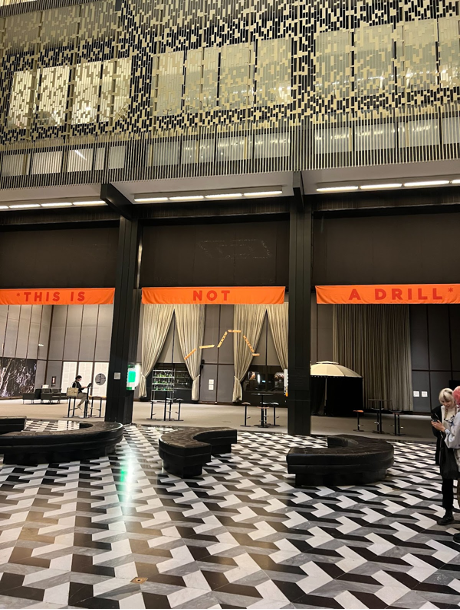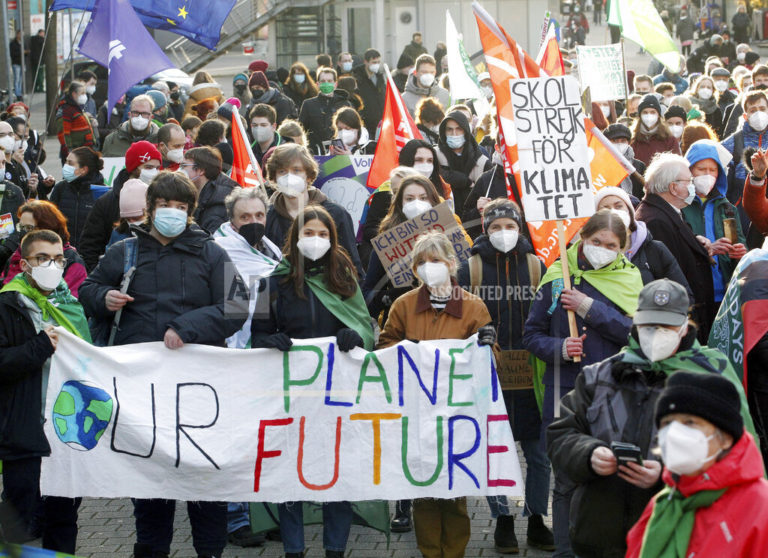
(Ujji Bathla/Zeitgeist)
At NYU’s Bobst library, a large open space on the right side of the lobby dons red banners spelling out the phrase “This is Not a Drill.” My first thought was that this is some attempt by the school to warn me of my looming midterms, but upon closer inspection, I found that it was something totally different. It was an exhibit displaying student artwork commenting on the climate disaster currently unfolding across the globe.
NYU has been quite vocal about wanting to reduce its carbon footprint, mainly through its largely advertised Climate Action Plan, which pledges carbon neutrality by 2040. They are reportedly on track to meeting this goal, a seemingly impressive feat.
However, like all corporations, NYU has left out much of the full picture in order to preserve its public image. In the recent decade or so, corporations have participated in what is colloquially referred to as “greenwashing”; an effort to seem more climate-conscious, while continuing to privately contribute to climate change, largely in order to appease younger generations.
The concern surrounding NYU’s direct investments in fossil fuel industries has been met with little to no response. In 2016, a University Senate resolution requested that no further investments be made in fossil fuel industries. Instead of acting, NYU’s Board stated that “the Board does not believe divestment is the proper action to take.” The board cited a multitude of reasons: including the fact that the endowment would take a substantial loss, implying a decline in the University’s US News ranking.
This is gravely concerning for climate-conscious members of the NYU community. Surprisingly, according to a statement released by University President Andrew Hamilton in March of this year, “indirect investments in fossil fuels equal about 2 percent of the NYU endowment (down from 7 percent in 2016).” Seemingly a win for everyone, but this surface-level data does not paint the complete picture.
While it seems like the university is genuinely interested in the fight against global ecological destruction, I was left with further questions. What people were on the Board of NYU? Who was NYU choosing to make the big decisions on campus, and how did the trustees attain the standing and notoriety that allowed them to lead one of the largest private universities in the country?
Currently sitting on the board of NYU Langone School of Medicine is Jamie Dimon, the CEO of Chase Bank. The company provided a staggering $317 billion to fossil fuels between 2016 and 2020 alone, making them the largest climate banker in the world. Protests and backlash have specifically been targeted towards Chase, as we’re beginning to see the more destructive effects of climate change around the world.
Also sitting on NYU’s Board of Trustees is Larry Fink. On top of being on NYU’s Board, Larry Fink is the Chairman and CEO of the investment firm BlackRock. BlackRock has a history of morally questionable investments, the most notorious being their fossil fuel investments, though they don’t see it that way.
BlackRock is a blatant example of a company bent on greenwashing its image. In a recent press release, Fink states that they “focus on sustainability not because we’re environmentalists, but because we are capitalists” and goes on to state “Blackrock does not pursue divestment as a policy.” The idea that sustainability should be seen from the perspective of a capitalist is directly opposed to progress in the field. We need immediate, effective action so sitting around and waiting for clean energy to become more profitable than fossil fuels is ineffective, complacent, and echoes the same ideas that brought us into this disaster in the first place. Fink yearns so deeply to be seen as a leader in the fight against climate change, but his own company believes that “proposals to end the expansion of fossil fuel production are ‘too prescriptive.’” Blackrock refusing to use the power they wield to push the hand of fossil fuel corporations is a clear display of complicity. BlackRock also remains the second largest shareholder in Exxon Mobil at nearly 7 percent.
Fink seems to be stuck in a paradox. He wants to appease an audience concerned with the future of our planet. On the other hand, when met with backlash against his half-measures from powerful forces in the fossil fuel landscape, he folds. And yet NYU, a university greatly concerned with maintaining an image of progressivism and climate action, continues to keep players like Fink and Dimon on their Board.
It is understandable that NYU wants powerful people affiliated with the school. Nonetheless, these people operate in direct antithesis to the school’s image, creating skepticism towards every move made by the school. The university’s tenets are marketing points peddled by a profit-seeking institution whose main concern is climbing the ranks and building prestige. NYU remains to be one of the best institutions for fostering new ideas, with an incredible faculty, campus and location. But like all institutions, improvements can be made.
As a member of the NYU community, I want the University to do better. This can be done by selecting board members who better reflect the ideas that they claim to hold so dear. NYU must also continue making more improvements directly to its campus. Until they clean house, whether the culture they foster is genuine will continue to be questioned.



